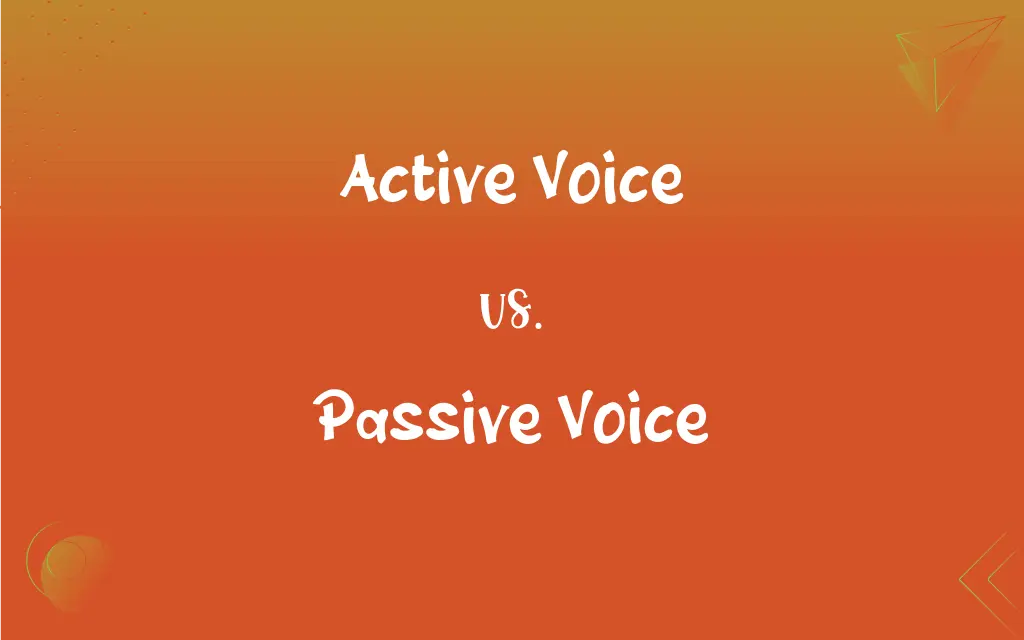Active Voice vs. Passive Voice: What's the Difference?
Edited by Aimie Carlson || By Janet White || Updated on November 18, 2023
Active Voice: subject performs action; Passive Voice: subject receives action.

Key Differences
In Active Voice, the subject of the sentence performs the action, leading to direct, clear, and impactful statements. In contrast, Passive Voice occurs when the subject of the sentence receives the action, often creating distance or objectivity.
Active Voice is generally straightforward and concise, making the writing more engaging and easier to understand. On the other hand, Passive Voice can be used to de-emphasize the actor, focusing instead on the action itself.
Active Voice is often used to maintain a fast-paced narrative, keeping readers interested and engaged. Conversely, Passive Voice is sometimes used to create an air of mystery or to be intentionally vague about who is performing the action.
Active Voice tends to be more direct in conveying who is doing what, contributing to the clarity and precision of the statement. Passive Voice, while sometimes less clear, can be useful when the actor is unknown or irrelevant.
In Active Voice, the sentence structure typically follows a clear "subject-verb-object" format. In Passive Voice, the target of the action gets promoted to the subject position, and the actual subject may be omitted or introduced with “by.”
ADVERTISEMENT
Comparison Chart
Focus
On the subject performing the action
On the action or the receiver of action
Clarity and Conciseness
Generally clearer and more concise
Can be less direct and more wordy
Sentence Structure
Subject-Verb-Object
Object-Verb-Subject (often)
Purpose in Writing
Direct, engaging narrative
Objectivity, emphasis on action
Actor Emphasis
Actor is emphasized
Actor is de-emphasized or omitted
ADVERTISEMENT
Active Voice and Passive Voice Definitions
Active Voice
Emphasizes the actor.
The chef cooks the meal.
Passive Voice
Focus on the action.
Mice are chased by cats.
Active Voice
Subject acts directly.
She paints a picture.
Passive Voice
Actor often omitted.
The meal is cooked.
Active Voice
Creates engaging narrative.
The detective solved the mystery.
Passive Voice
Used for objectivity or vagueness.
The mystery was solved.
Active Voice
Offers clarity and precision.
The company launched a new product.
Passive Voice
Actor can be irrelevant.
A new product was launched.
Active Voice
Direct sentence structure.
Cats chase mice.
Passive Voice
Subject is acted upon.
A picture is painted by her.
FAQs
Does Active Voice emphasize the subject?
Yes, it highlights the subject's actions.
Can Passive Voice be objective?
Yes, it's used for impartiality.
Is Active Voice more engaging?
Generally, due to directness and clarity.
Does Active Voice follow a structure?
Typically, it's "subject-verb-object."
Is Passive Voice less direct?
Often, as it may omit the actor.
Can Passive Voice emphasize the receiver?
Yes, the focus is on the action's receiver.
Can Active Voice quicken the pace?
Yes, it's direct and keeps reader interest.
Is Passive Voice formal?
It's used in formal and scientific contexts.
Does Passive Voice obscure the actor?
It can, especially if omitted.
When is Passive Voice used?
For emphasis, mystery, or irrelevance of actor.
Is Active Voice clearer?
Usually, it's more straightforward.
Can Active Voice clarify actions?
Yes, by directly showing who does what.
Is Passive Voice always wordy?
Not always, but it can be less concise.
Should Active Voice dominate writing?
Generally, unless strategic passivity is needed.
Is Passive Voice passive-aggressive?
Not necessarily; it's a grammatical choice.
Does Passive Voice complicate sentences?
It can, by rearranging or extending structure.
Is Active Voice better for storytelling?
Often, for immediacy and engagement.
Is Active Voice assertive?
It can be, due to its directness.
Does Passive Voice avoid responsibility?
It can de-emphasize or omit the actor.
Is Active Voice concise?
Generally, it's more succinct.
About Author
Written by
Janet WhiteJanet White has been an esteemed writer and blogger for Difference Wiki. Holding a Master's degree in Science and Medical Journalism from the prestigious Boston University, she has consistently demonstrated her expertise and passion for her field. When she's not immersed in her work, Janet relishes her time exercising, delving into a good book, and cherishing moments with friends and family.
Edited by
Aimie CarlsonAimie Carlson, holding a master's degree in English literature, is a fervent English language enthusiast. She lends her writing talents to Difference Wiki, a prominent website that specializes in comparisons, offering readers insightful analyses that both captivate and inform.































































